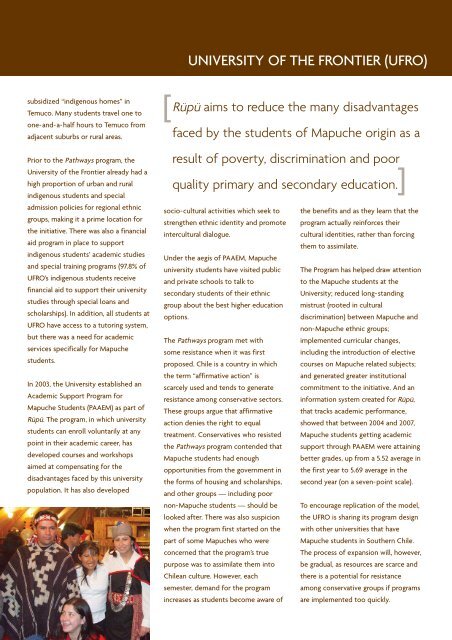Pathways to Higher Education - Ford Foundation
Pathways to Higher Education - Ford Foundation
Pathways to Higher Education - Ford Foundation
Create successful ePaper yourself
Turn your PDF publications into a flip-book with our unique Google optimized e-Paper software.
UNIVERSITY OF THE FRONTIER (UFRO)<br />
subsidized “indigenous homes” in<br />
Temuco. Many students travel one <strong>to</strong><br />
one-and-a-half hours <strong>to</strong> Temuco from<br />
adjacent suburbs or rural areas.<br />
Prior <strong>to</strong> the <strong>Pathways</strong> program, the<br />
University of the Frontier already had a<br />
high proportion of urban and rural<br />
indigenous students and special<br />
admission policies for regional ethnic<br />
groups, making it a prime location for<br />
the initiative. There was also a financial<br />
aid program in place <strong>to</strong> support<br />
indigenous students’ academic studies<br />
and special training programs (97.8% of<br />
UFRO’s indigenous students receive<br />
financial aid <strong>to</strong> support their university<br />
studies through special loans and<br />
scholarships). In addition, all students at<br />
UFRO have access <strong>to</strong> a tu<strong>to</strong>ring system,<br />
but there was a need for academic<br />
services specifically for Mapuche<br />
students.<br />
In 2003, the University established an<br />
Academic Support Program for<br />
Mapuche Students (PAAEM) as part of<br />
Rüpü. The program, in which university<br />
students can enroll voluntarily at any<br />
point in their academic career, has<br />
developed courses and workshops<br />
aimed at compensating for the<br />
disadvantages faced by this uni versity<br />
population. It has also developed<br />
[ Rüpü aims <strong>to</strong> reduce the many disadvantages<br />
faced by the students of Mapuche origin as a<br />
result of poverty, discrimination and poor<br />
quality primary and secondary education.]<br />
socio-cultural activities which seek <strong>to</strong><br />
strengthen ethnic identity and promote<br />
intercultural dialogue.<br />
Under the aegis of PAAEM, Mapuche<br />
university students have visited public<br />
and private schools <strong>to</strong> talk <strong>to</strong><br />
secondary students of their ethnic<br />
group about the best higher education<br />
options.<br />
The <strong>Pathways</strong> program met with<br />
some resistance when it was first<br />
proposed. Chile is a country in which<br />
the term “affirmative action” is<br />
scarcely used and tends <strong>to</strong> generate<br />
resistance among conservative sec<strong>to</strong>rs.<br />
These groups argue that affirmative<br />
action denies the right <strong>to</strong> equal<br />
treatment. Conservatives who resisted<br />
the <strong>Pathways</strong> program contended that<br />
Mapuche students had enough<br />
opportunities from the government in<br />
the forms of housing and scholarships,<br />
and other groups — including poor<br />
non-Mapuche students — should be<br />
looked after. There was also suspicion<br />
when the program first started on the<br />
part of some Mapuches who were<br />
concerned that the program’s true<br />
purpose was <strong>to</strong> assimilate them in<strong>to</strong><br />
Chilean culture. However, each<br />
semester, demand for the program<br />
increases as students become aware of<br />
the benefits and as they learn that the<br />
program actually reinforces their<br />
cultural identities, rather than forcing<br />
them <strong>to</strong> assimilate.<br />
The Program has helped draw attention<br />
<strong>to</strong> the Mapuche students at the<br />
University; reduced long-standing<br />
mistrust (rooted in cultural<br />
discrimination) between Mapuche and<br />
non-Mapuche ethnic groups;<br />
implemented curricular changes,<br />
including the introduction of elective<br />
courses on Mapuche related subjects;<br />
and generated greater institutional<br />
commitment <strong>to</strong> the initiative. And an<br />
information system created for Rüpü,<br />
that tracks academic performance,<br />
showed that between 2004 and 2007,<br />
Mapuche students getting academic<br />
support through PAAEM were attaining<br />
better grades, up from a 5.52 average in<br />
the first year <strong>to</strong> 5.69 average in the<br />
second year (on a seven-point scale).<br />
To encourage replication of the model,<br />
the UFRO is sharing its program design<br />
with other universities that have<br />
Mapuche students in Southern Chile.<br />
The process of expansion will, however,<br />
be gradual, as resources are scarce and<br />
there is a potential for resistance<br />
among conservative groups if programs<br />
are implemented <strong>to</strong>o quickly.

















